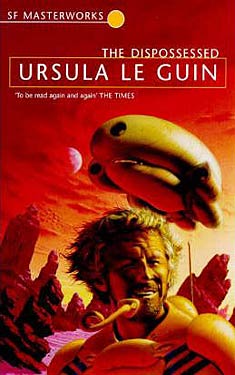Ursula K. LeGuin
Read 2012, reviewed 5/19/2013
4 stars
I love Ursula LeGuin’s writing. She creates amazingly detailed
societies. This book has two societies,
and the process of the book makes you compare and contrast them. Each society believes it is utopian, but both
are dysfunctional in one way or another.
It is clear that she is mirroring the US
and Soviet Union . Each thinks they are better than the other,
full of tension and suspicion, yet both are being confronted with the idea of
accepting each other through interactions of an individual. Clearly, both sides are flawed, but being
brought up in one society makes you suspect of the other, no matter how open
you may be to the other. This eventually
inhibits the exchange of ideas, and eventually each society’s people.
 Though I was young during the cold war of the 60s, I
remember the tension between the
Though I was young during the cold war of the 60s, I
remember the tension between the
I loved the structure of the book, with chapters alternating
between the current plot, and the life of the main character, Shevek. You get to see snippets of his life that form
his perception of the world, followed by a chapter of his current situation on
the rival planet where his response to events are based on the snippets from
the previous chapter.
The one thing I didn’t like about the book is that it felt
cold and disaffected. Granted Shevek’s
home planet is a cold, unyielding place, and it is reflected in the
storytelling. Maybe it’s because I had
just read Left Hand of Darkness and was feeling tired of the cold, unyielding
planet story. But I felt the harshness through
Shevek’s interactions on the lusher rival world. Again, this reflects the feel of the
harshness of the Soviet Union and how one maintains that paradigm even when
presented with the alternative of the US .
It almost makes the novel read like a documentary instead of fiction.
I give the book 4 stars despite my criticism of the coldness
of the book. It is a masterful work of SF,
observing current events through an alternative perspective. And despite the coldness, I did relate to
Shevek and his plight, finding myself caught up in the same questions I did as
a child. Can’t we just be friends?
No comments:
Post a Comment